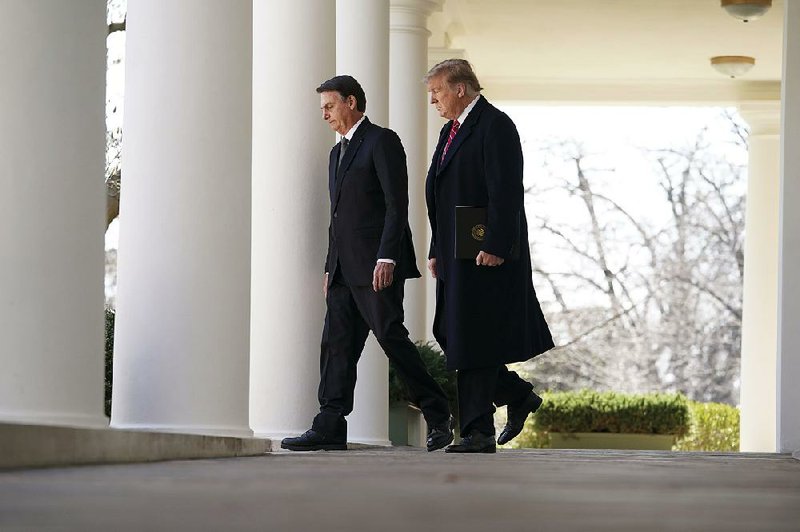WASHINGTON -- President Donald Trump said Tuesday that he will work to designate Brazil a "major non-NATO ally" -- and maybe even full NATO membership -- as he welcomed the country's new leader to the White House, despite the fact that Brazil doesn't qualify to join the North Atlantic alliance.
As they sat down for the first time, Trump praised Jair Bolsonaro, saying he'd done "a very outstanding job" so far and hailed his run as "one of the incredible campaigns." Trump said he was "honored" Bolsonaro's campaign had drawn comparisons with his own 2016 victory. And he predicted the two would have a "fantastic working relationship," telling reporters at a joint news conference that they have "many views" in common. The two also exchanged soccer jerseys in a sign of friendship.
Bolsonaro has made clear he wants to strengthen military and economic ties with the U.S., and Trump appeared eager to deliver, announcing that he would back Brazil's effort's to join the Organization for Economic Co-operation and Development.
Trump also told reporters he intends to designate Brazil as "a major non-NATO ally" or "even, possibly, if you start thinking about it, maybe a NATO ally," though he said he'd "have to talk to a lot of people" for Brazil to join the organization.
Brazil, the largest and most populous nation in Latin America, has pursued becoming a non-NATO ally to make it easier to buy U.S. weapons and lower barriers for military and other cooperation.
But James Stavridis, a retired Navy admiral who was the Supreme Allied Commander at NATO from 2009 to 2013, said Brazil does not qualify for full membership under the North Atlantic Treaty of 1949.
"The idea of formal membership is a nonstarter in every dimension -- the treaty doesn't allow it, the Brazilians wouldn't want it and the Europeans wouldn't approve," Stavridis said in an email exchange.
NATO's own membership policy says it is open only to any "European state" that is "in a position to further the principles of this treaty and to contribute to the security of the North Atlantic area."
Standing side-by-side in the White House Rose Garden, Bolsonaro told Trump the U.S. and Brazil stand together in support of "liberties," including "traditional family lifestyle," and "against the gender ideology or the politically incorrect attitudes and against fake news."
"I'm very proud to hear the president use the term 'fake news,'" Trump later remarked.
As a congressman, Bolsonaro frequently made disparaging comments about gays, women, indigenous groups and blacks, and he has praised torture and killings by police. While such comments have drawn sharp criticism, they have also generated attention and fed into his narrative as a leader unencumbered by political correctness.
Bolsonaro has also called for hard-line immigration policies, calling immigrants from several poor countries the "scum of the world" and saying Brazil cannot become a "country of open borders."
The two leaders were expected to discuss a range of issues during their visit, including expanding trade relations, increasing U.S. private-sector investment in Brazil and resolving the ongoing political crisis in Venezuela. Both are fierce critics of Venezuela's socialist President Nicolas Maduro.
Days after taking office on Jan. 1, Bolsonaro, a former army captain, said Brazil would consider letting the U.S. have a military base in the country as way to counter Russian influence in the region, particularly related to Brazil's neighbor Venezuela.
That statement was roundly criticized, including by former military members of his government, and the administration backed off.
Bolsonaro, who says closer U.S. ties are key to Brazil's future, sought to underscore his pro-America stance throughout his visit.
"For the first time in a while, a pro-America Brazilian president arrives in DC," he tweeted after arriving Monday. "It's the beginning of a partnership focused on liberty and prosperity, something that all of us Brazilians have long wished for."
Information for this article was contributed by Mauricio Savarese, Ben Fox, Robert Burns, Matthew Lee, Catherine Lucey and Darlene Superville of The Associated Press.
A Section on 03/20/2019
